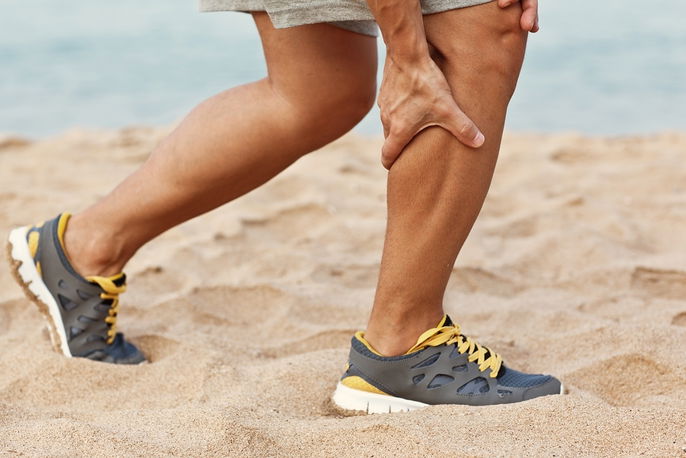What is it:
A muscle spasm is a quick contraction of the muscle that is involuntary and painful. It can occur in any part of the body, but they are normally felt in the feet, hands or legs, particularly in the calves and hamstrings.
Generally, these muscle cramps are not serious and last for less than 10 minutes. They are particularly felt following intense physical exercise, due to a lack of water going to the muscle. Spasms can also be felt during pregnancy or due to health conditions like a mineral deficiency, diabetes, liver problem or myopathy. They are popularly referred to as a "charley horse".
If you have more than one muscle spasm per day or if it lasts for over 10 minutes, you should see your doctor to determine why it is happening and initiate treatment as necessary.

The most common causes of muscle spasms are:
1. Excessive physical exercise
After exercising intensely or for a long time, it is common to experience muscle spasms. This occurs due to muscular fatigue and also due to the muscle’s consumption of minerals throughout activity, leaving mineral levels low.
In this case, the cramps can be felt during exercise or hours later. Staying still for too long, particularly in the same position, can trigger spasms.
2. Dehydration
Muscle cramps can often be a sign of mild to moderate dehydration. This can be common in very hot environments that promote sweating, but people taking diuretics can also be prone to experiencing muscle spasms, due to a great loss of water.
Usually, people who dehydrated with experience muscle spasms as well as a dry mouth, thirst, decreased urine output and fatigue.
3. Lack of calcium or potassium
Some minerals, like calcium and potassium, are very important for muscle contraction and relaxation. When these mineral levels decrease, muscle spasms can occur throughout the day, for no apparent reason.
Decreased calcium or potassium levels are more common in pregnant women, in people who use diuretics, or following many episodes of vomiting. However, it can also be a result of decreased dietary intake of potassium or calcium.
4. Tetanus
Although it is more rare, tetanus is another possible cause for muscle spasms or twitching. This infection promotes constant triggering of nerve cell terminals throughout the body, leading to muscle cramping and contractions.
A tetanus infection mainly occurs following a cut from a rusty object, and can cause other symptoms like neck muscle rigidity and low grade fever.
5. Poor circulation
People with poor circulation may have more frequent muscle spasms due to decreased blood flow and oxygen to the muscle. This type of cramping is common in the legs, especially in the calves.
6. Medications
Diuretics, like furosemide, can lead to dehydration, which can cause muscle spasms. There are other medications, however, that can cause involuntary muscle contractions as a side-effect.
Some medications that may cause muscle spasms include donepezil, neostigmine, reloxifene, nifedipine, terbutaline, salbutamol or lovustatin.
How to relieve muscle cramps
There is generally no specific treatment for muscle spasms, however they can usually be relieved by stretching the affected muscle and massaging it.
You can prevent muscle cramps by considering the following:
- Consume food that is rich in potassium, magnesium and calcium, like bananas or coconut water.
- Drink about 2 liters of water per day, especially during physical activity
- Avoid exercising after meals
- Stretch before and after exercising
- Stretch before going to bed if you experience nocturnal cramping
Muscle spasms caused by health conditions, like diabetes, liver problems or mineral deficiencies, can be treated with nutritional supplements, like sodium or potassium, and by ensuring the conditions are well-managed.
When muscle spasms are serious
In most cases, muscle cramps are not a serious problem, however there are some cases where they may be triggered by a lack of minerals or other health problem. You should see a doctor for assessment if your muscle spasms are accompanied by the following symptoms:
- Very intense pain that does not improve within 10 minutes
- Swelling and redness in the cramp area
- Emergence of muscle weakness following cramping
- Cramps that occur several times within a few days
If your muscle spasms are not related to an obvious cause, like dehydration or intense physical activity, you should see your doctor to evaluate whether you have a mineral (e.g. potassium or magnesium) deficiency.






























